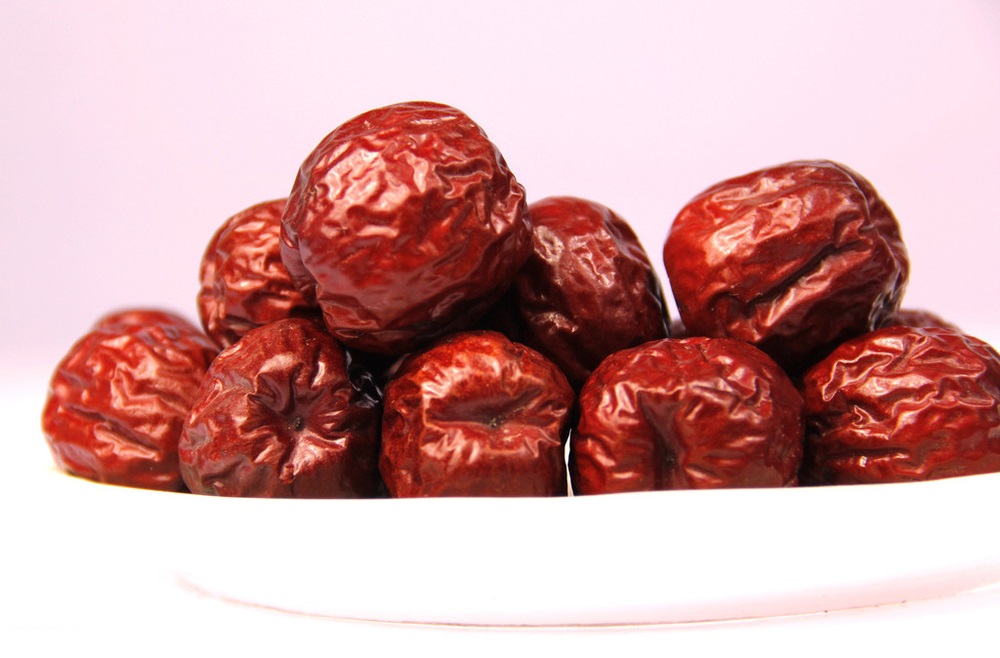Health Benefits of Jujubes
Jujubes are a very interesting fruit with an even more interesting history. From the Rhamnaceae or Buckthorn botanical family, they’ve been cultivated in China for more than 4,000 years. There are at least 400 jujube varieties, successfully developed for their distinctive characteristics – principally varieties best for eating fresh and others for drying to attain a chewy, date-like consistency. While jujube trees are extremely hardy and can flourish in even extreme temperatures with as little as eight inches of rainfall a year, they prefer sunny over shady areas.
Sometimes called red dates, Chinese dates, Korean dates, or Indian dates, jujubes come from deciduous and relatively small trees. Jujube trees grow at around 40 feet with shiny green leaves, modest-looking blossoms, and grape-to-strawberry-sized fruits containing a single large seed in the center. This makes them drupes.
Jujubes are red inside and out, with a crispy texture, edible skin, and a sweet-tart, apple-like flavor. When ripe, they can be stored at room temperature for about a week.
Jujubes weren’t much of a hit when introduced in the States in the late 1800s because they tried propagating a variety meant for drying. Not until the 1990s was the first truly tasty jujube variety imported into the U.S. by a private individual, and two more in 2007.
The best fresh jujube varieties to look for include Sugar Cane, Li, Sherwood, Chico, and Honey Jar (the latter reportedly the smallest and juiciest). The best drying varieties are Lang and Shanxi Li.
Dried jujube varieties can be used to substitute dates or apples in recipes. Just peel the fruit and remove the single seed inside. Jujubes can also be pickled whole or used to make tea.

While they may not have a large amount of any one nutrient, jujubes contain a wide array of different ones, including magnesium, potassium, copper, niacin, calcium, manganese, phosphorus, and iron. They contain 20 times more vitamin C than any citrus fruit, strengthening the immune system and fighting infections, which may be why they’ve been used medicinally for millennia in many cultures, as a tea for sore throat, for example.
Medical studies have found that jujube fruits and extracts have the capacity help lower blood pressure, reverse liver disease, treat anemia, and inhibit the growth of tumor cells that can lead to leukemia. Jujube extracts are also used in skin care products used to diminish wrinkles, relieve dry skin, and treat sunburn pain.
How one fruit can have all these benefits has to do with not just the combination, but also the complexity of its phytonutrients. Scientists have identified eight flavonoids in jujube fruit, including spinosin and swertish, which have sedative properties – undoubtedly the reason jujube seeds are used to treat anxiety and insomnia in traditional Chinese medicine.
The free radical-scavenging phenol puerarin in jujubes helps keep your cholesterol levels in the normal range and decrease your risk of cardiovascular disease. The flavonoid apigenin (also found in chamomile, thyme, and red wine) contains antioxidants as well as anti-inflammatory and anti-tumor properties, helping to reduce the risk of cancer and positively impact the liver, digestion, and allergies.
Jujubes are also loaded with 18 of the most important amino acids, which aids in the formation of more than 50,000 proteins in the body, one of which triggers the wound-healing process.
Dried jujube varieties can be used to substitute dates or apples in recipes. Just peel the fruit and remove the single seed inside. Jujubes can also be pickled whole or used to make tea.
However, consume jujubes in moderation because they contain fructose, which may be harmful to your health in excessive amounts.
Studies on Jujubes
Studies in 2012 on deproteinized polysaccharide extracted from jujube fruit was determined to be a potential anti-skin cancer agent, which scientists suggested be used for further in vivo and clinical trial experimentation for this purpose. The essential oil of ziziphus jujuba also was found to possess hair growth promoting activity, and the extract was found to be an effective, safe treatment for chronic constipation and related maladies.
















 Supreme Court Makes FIRST MAJOR RULING on Trump ACTS
Supreme Court Makes FIRST MAJOR RULING on Trump ACTS












